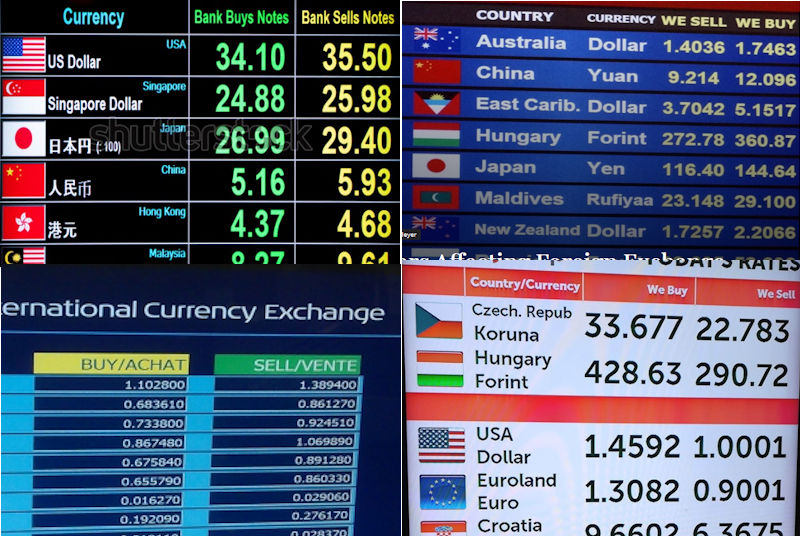The Top 10 Tips For Currency Conversion Fees In Terms Of Exchange Rates And Rates. Rates
The cost of currency conversion is becoming more important in the worldwide economy. They are an essential element in any financial transaction whether it's a travel abroad, business in another country, or a management of foreign currency investments. The fees you pay for conversion depend on your service provider as well as the exchange method you use and the currencies you are using. Understanding these fees will allow you to cut costs and make better choices. Here are the top ten details on how to avoid currency conversion charges that can benefit travelers as well as investors, companies, and business alike.
1. What are the various types of conversion charges?
The fees associated with currency conversion may be in different forms, including transactions fees, service charges, and exchange rate markups. Fees for transactions are set for each exchange. Service charges may be a percentage of the amount converted. Markups in exchange rates are when a service provider provides an exchange rate that is lower than the market rate. Familiarizing yourself with these different types of charges will assist you in choosing the most cost-effective options to meet your specific needs.
2. Compare rates from multiple providers
It's crucial to compare the rates of various currency exchange providers before exchanging your currency. The kiosks for currency exchange and banks and online platforms may have different charges and exchange rates. Use currency converters for real-time rates, and to estimate the total cost, which includes fees. This can help you to find the best deal, and also save money, particularly when you're exchanging large amounts.
3. There are no-cost options for currency exchange
Certain financial institutions or banks provide accounts that offer free currency conversion, or lower costs for specific transactions. Some online banks and fintechs offer free currency conversions for their customers who have accounts. Think about opening an account with one of these companies if you regularly deal in foreign currencies.
4. Be aware that DCC (Dynamic Currency Conversion) charges can be high
If you are paying with a debit or credit card abroad, it is possible that you'll be offered the option of paying in local currency using a program called Dynamic Conversion. This may seem convenient but it could result in increased conversion costs or poor rates of exchange. Always opt to pay in local currency to avoid additional fees, ensuring you get the best exchange rate available.
5. You can make use of credit cards without having to pay foreign transaction fees
You will save money when you use credit cards with no charge for foreign transactions while you travel. Numerous travel-related credit cards offer this advantage, allowing the purchase of items in foreign countries without incurring any additional costs. It is important to choose the credit card that is best suited to your lifestyle and offers an exchange rate that is favorable.
6. Consider ATMs as a Source of Currency Withdrawal
The exchange rate is often higher at ATMs than kiosks for currency exchange. Be aware of any charges imposed by your bank, as well as the ATM operator. Avoid dynamic currency conversion fees when you use ATMs that are linked to your bank.
7. Plan for Currency Conversion in Advance
Do not make last-minute exchanges of currency at airports or tourist hotspots. The fees charged are much higher. You should plan your exchange ahead to get cheaper rates and less fees. It is possible to exchange a modest amount prior to your travels to cover immediate expenses. Then, you can convert a larger amount after you arrive at favourable rates.
8. Monitor Trends in Exchange Rates
– Keeping an eye on exchange rate trends can help you identify the most advantageous times to change your currency. Monitor these trends to be able to make the most of your exchanges. Utilize information from financial news and historical data to make your decisions.
9. Factors that can cause hidden fees in Transactions
Beware of hidden charges. This can include service charges, maintenance fees for accounts with foreign currencies, or undesirable exchange rates. You should always be sure to read the fine print and ask questions in order to understand the full range of charges that are associated with conversion of currency. This can help you avoid any charges that are unexpected, and will allow you to make better financial choices.
10. Consult with financial experts for major purchases
Financial experts can be a valuable source when you have to make large-scale transactions or if your exchanges are complex. Experts in currency provide valuable insight regarding how you can reduce the cost of conversion and improve your transactions. This is particularly important to businesses engaged in international trade or investors seeking to manage the exposure to currency.
Utilize these suggestions to help you navigate the complexities of exchange rates, whether you're travelling across the globe, doing business abroad, or managing foreign currency investments. Knowing the intricacies behind conversion fees will aid you in making better financial decisions that are aligned with the goals of your business or personal life. You can save money and improve your financial planning strategies by understanding these subtleties. Read the recommended USD to AUD for site advice including swiss franc to usd, doller to rupee, baht to usd, usd to colombian peso, usd to thb, usd to mxn, japanese yen to usd, pesos to usd, php to dollar, 1 us dollar in indian rupees and more.

Top 10 Tips On Destination Currency And Currency Exchange Rates
Knowing the currency of your destination is essential for anyone who is traveling overseas, conducting business internationally or managing investments on foreign markets. The destination currency is the local currency of the country you are in or dealing with and can significantly impact your financial decisions. Fluctuations in exchange rates, conversion fees as well as the general economic climate can impact how much you spend when traveling, or how profitable your business operations and investments are. By learning about the destination's currency and its implications you can optimize your finances and make informed choices. Here are the top ten tips to manage your currency of choice.
1. Before you travel, research the currency of your destination.
Learn about the local currency. It is also important to familiarize yourself with different currency denominations and its relative value to your own currency. You can manage your budget and avoid overpaying when you have this knowledge. Websites like XE.com offer real-time information and historical exchange rates which allows you to determine the worth of your currency in foreign currency.
2. Keep an eye on the exchange rate before your departure
– Exchange rates can fluctuate significantly as time passes, and keeping track of these changes can help you determine the best time to exchange your money. To set alerts on advantageous exchange rates, use applications and software for tracking currency. If you observe a weakening trend, make sure to exchange your cash earlier to increase the buying capacity of your trip.
3. Think about the Costs of Currency Conversion
Conversion fees for currency differ widely between banks, exchange services and ATMs. Take note of expenses related to converting your currency of origin to the currency you wish to use and these costs can eat into your budget. Compare rates with different companies and seek out online platforms that have lower fees and better exchange rates.
4. Make use of local currency for transactions
If you are paying for purchases overseas It is always best to pay in local currency than your own. If you decide to pay using your home currency, it will often result in an automatic currency converter (DCC), with higher costs and lower exchange rates. If you pay in local currency, you'll be able to benefit from lower exchange rates and save the cost of.
5. Prepare your cash needs in advance
Although debit and credit cards may be widely accepted in many countries, it is best to keep cash on hand for smaller purchases, tipping, or other places that might not accept credit cards. Check out the withdrawal limits for cash and charges associated with using ATMs abroad, and consider withdrawing a larger amount at once to minimize charges for transactions. The convenience of having local currency available will enhance your experience while traveling and avoid inconveniences.
6. Understand Local Payment Preferences
Different countries have their own preferences when it comes to payment methods. Cash is king in some areas, while digital payments and credit card transactions are more prevalent. Examine the payment habits in your area to learn the accepted methods of payment. This information can aid you in planning your payment strategies and ensure that you are equipped to make transactions smoothly.
7. Business Currency Risks: Be Watchful
If you're conducting business in a different country Be aware of risk to your currency if there are fluctuations in exchange rates. The sudden fluctuations in the value of the currency destination can influence profit margins as as general financial performance. You can use hedging techniques such as forward contracts to safeguard against currency fluctuations and to lock in the rates of future transactions.
8. Track Your Spending
– Tracking your expenditure in the currency of your destination is essential for staying within your budget while you travel. Budgeting applications as well as detailed expense records help you track your currency usage in the local currency. You'll be able to monitor how much you spend in local currency, and you will be able to avoid spending too much.
9. Financial Regulations – Become educated
– Different countries have various rules in relation to currency exchange as well as cash transactions and reporting obligations. Be aware of these rules to avoid potential legal issues when traveling or conducting business. It is possible that certain countries have limitations regarding the amount of cash you can take in and out of the country, or require that you declare purchases of a significant amount. It is possible to navigate these rules easier if well-informed.
10. Consult Currency Experts before investing
If you're looking to track your foreign investments, you should consult with experts in currency or international financial advisors. They can give you insight into the impact of currency fluctuations on your portfolio of investments, and help you develop strategies to manage risk in the currency market efficiently. Their knowledge will assist you navigate the complexity surrounding destination currencies and optimize your financial results.
Use these tips for a thorough way to manage the currency of your destination, and you'll be able to navigate the complex world of business, travel and investment management more effectively. Understanding the significance and advantages of destination currency will help you make better financial choices in line with your goals. This will improve your overall experience and your financial strategy. Take a look at the top rated CZK to EUR for site tips including mexican peso to usd, currency exchange near me, usd to rs, euro usd, dollar to inr, usd to aud, dollar to canadian dollar, yen to us dollar, chf to usd, vnd to usd and more.

